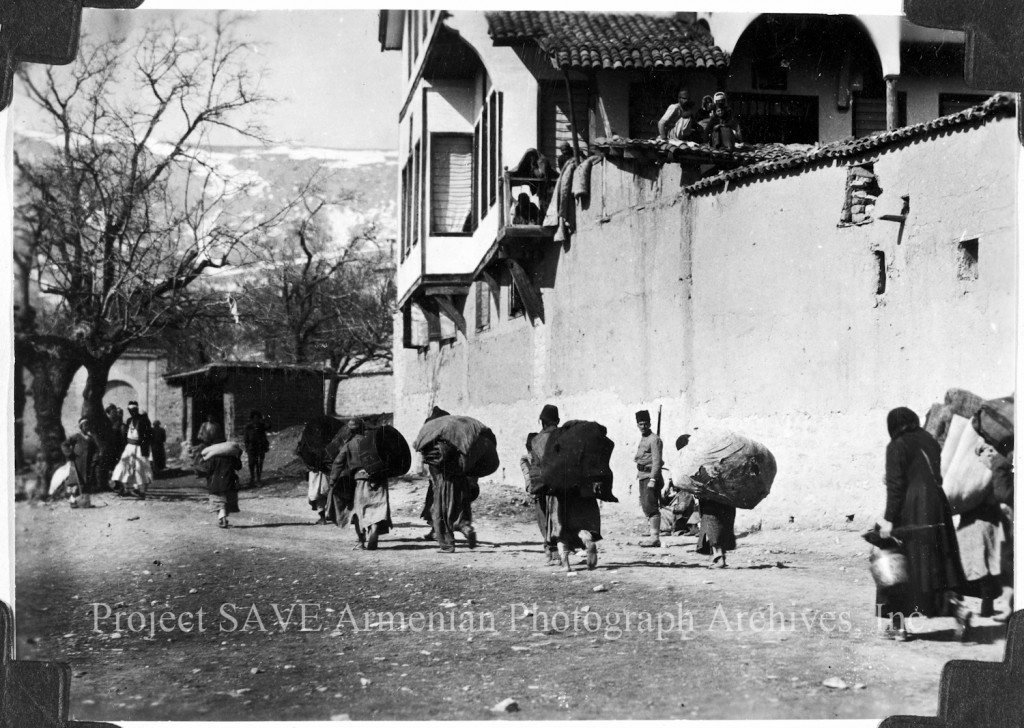Dear Editor,
Here I sit looking out my second-floor window in Watertown, Mass., as yet another blizzard-load of snow dumps itself during this record-breaking February. The silent gusts of wind blow snow parallel to the ground, creating drifts several feet high on top of several feet of previously fallen snow. Once again, I am not going anywhere—I can’t even safely walk to my office at Project SAVE Armenian Photograph Archives, about a mile away.

My mind wanders. We do complain a lot about being inconvenienced by the snow. Or, like school kids, we rejoice—probably in private—at having a day off at the boss’s expense. I, for one, am amused at how Mother Nature lets us know who is in charge. No amount of modern technology can deter her from her lessons. Snowstorms slow us down, and of late, bring our daily business to a skidding halt. There is no fighting it. So I attempt a positive approach, trying to enjoy the break in my routine that the snow provides.
On this third consecutive Monday of blizzard conditions, a picture comes into my wandering mind: the blizzard of Febrary 1920 in Cilician Armenia of the Ottoman Empire. How profound, I think to myself, that in this current year commemorating the 100th anniversary of the start of the Armenian Genocide, our winter here in Massachusetts is replicating the weather endured by Armenians 95 years ago in the Cilician city of Marash, as they made their treacherous final escape from the Turks, south through the mountains to the Mediterranean seaport of Adana/Mersin.
Several years earlier, at the close of World War I, Armenians who had survived the death marches returned home from exile in the desert, confident that Marash was now safe, having been placed by the European victors under a protectorate known first as the British Mandate, and after the Brits pulled out having thought better of the idea, it became the French Mandate. French soldiers were garrisoned in Marash, patrolling the streets to keep the peace between Turks and Armenians.
But neither did the French Mandate last very long in Marash. The French military soon grew weary of their hopeless efforts to quench Turkish violence against the Armenians and their own troops. So, unannounced, the French pulled their forces out of Marash under the cover of a blizzard. No one bothered to alert Armenians that their protectors were leaving town. But word spread fast, and Armenians who were able, quickly and quietly decided to take leave of their homes and follow the French out of Marash. The French made no concerted efforts to shepherd the Armenians. The military with their horses and wagons led the march and the Armenians, with no provisions, followed on foot in the wagon tracks.
No one, understandably, was taking photographs during this deadly trek, but thousands of words of eye-witness accounts have been told or written, mostly by those who were little children at the time.
So here I sit, free and unfettered in the United States, grousing that the snowplow has yet again plowed my driveway in, that I will have to spend two hours shoveling the front steps and sidewalk and, yes, another two hours to “shovel” the snow off my car. At least it’s in my driveway and not parked on a city street, plowed in with a snow bank as high as the car. As I try to count my blessings, my mind goes back to what I know about the Marash Armenians on the trek of their lives: An exhausted elder saying, “Just let me sit beneath this tree—you go on.” The just-born baby crying for its mother’s milk, and the mother still in post-partum stress. The father who slaps his preteen daughter into awakeness so that she keeps moving her feet in step with his; it seemed cruel to her at the time, but years later when she told her story, she knew that it had been a life-saving slap.
History certainly helps us keep reality in perspective.
Sincerely,
Ruth Thomassian



Dear Ruth,
What a wonderful reminder to let us all realize how fortunate we are to plow the snow and then go back inside our warm homes. Description of Marash situation in February of 1920 was described in my late aunt’s memoirs and of course also in detail in one of my favorite books “The Lions of Marash”. My grandparents were from Marash and yes, they went back to the city after English and French were suppose to protect the Armenian community. Of course many perished in the terrible winter trying to get away from turks.
Thank You for the wonderful article.
Lydia Tutunjian
Excelente artigo, a história oral dos nossos antepassados, nôs dão forças para continuar a lembrar e relembrar enquanto formos vivos as atrocidades praticadas contra o povo armênio!
Thanks for this article and good luck on your project would like to know more about it
Yes, this is a wonderful article, but I really hope everyone reading the Weekly realizes how important a treasure Ruth Thomassian is and has been for many years. She has worked tirelessly and diligently to preserve the visual images that remind us – and the world – of Armenian life and real people, not all that long ago and mostly in Turkey. We have no pictures of Haik, or Mashdots or Naregatsi, but we have a cohesive body of very important photos, due to her perseverance. This documentation is irreplaceable and its importance should not be underestimated, as a visual reminder of what was and what could have been.
Thank you so much, Ruth. May I post your comments on my blog, MarashGirl.blogspot.com?